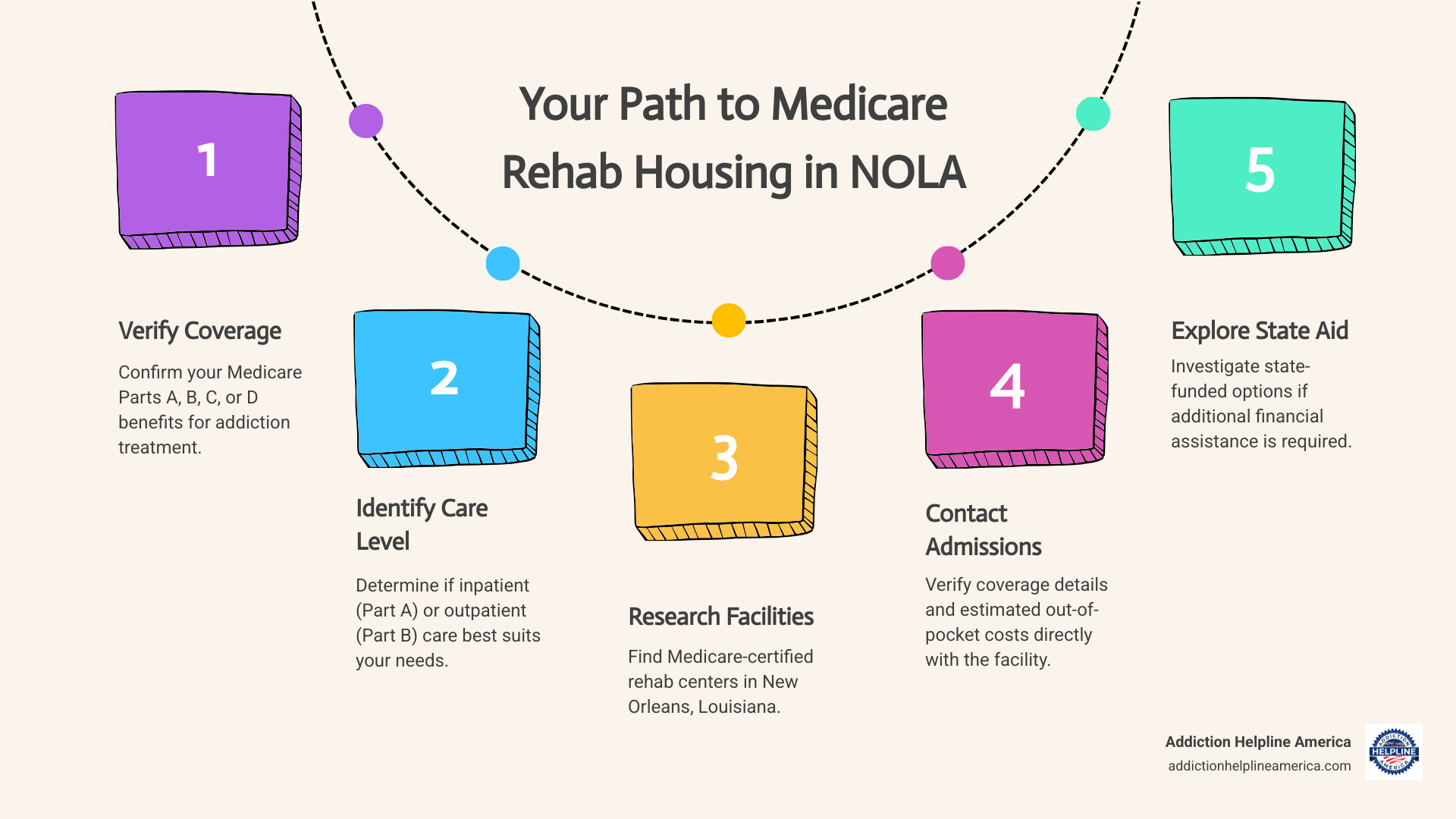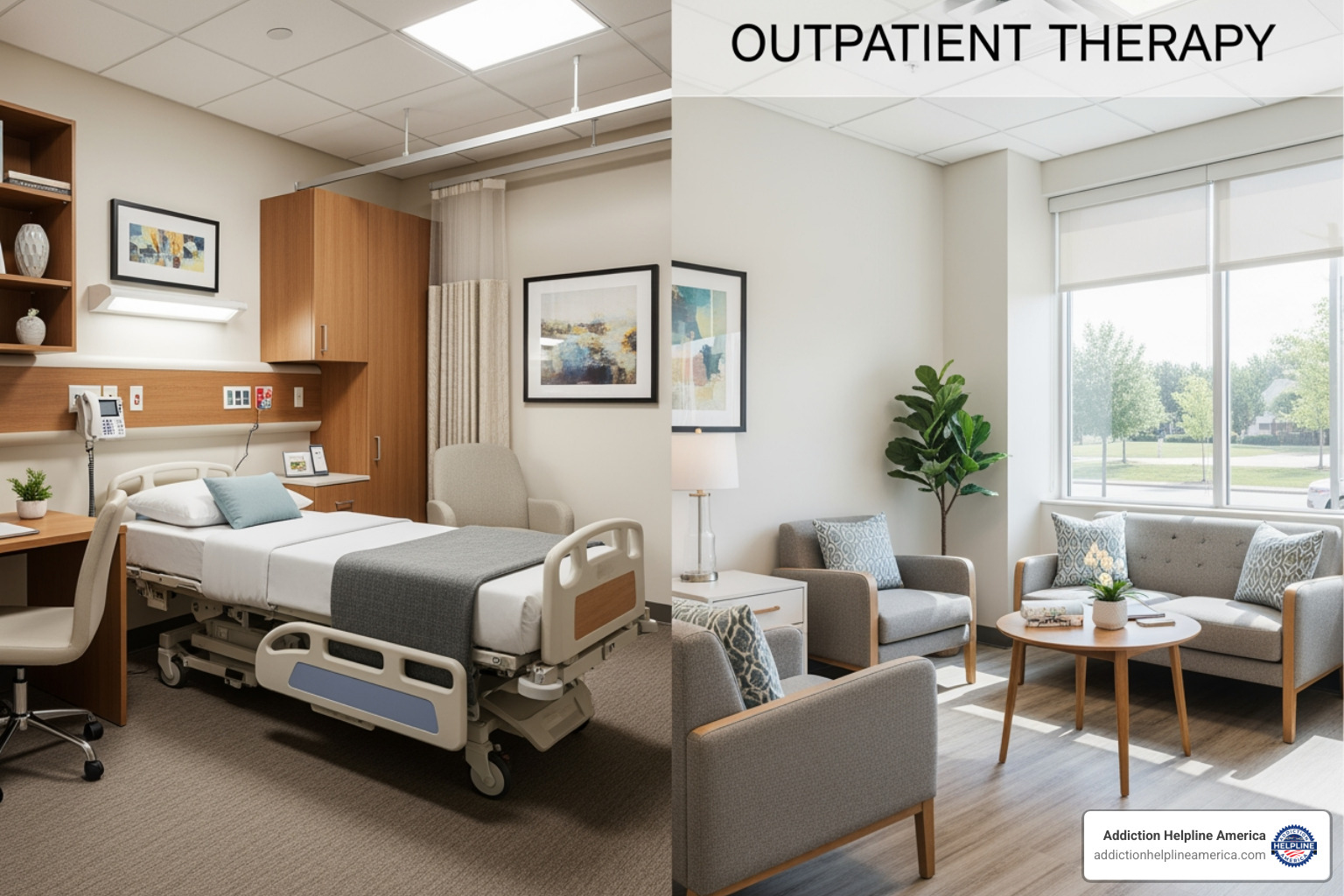
Finding Hope and Support Through Medicare-Covered Rehab Housing
Drug rehab housing in new orleans louisiana take medicare is available, and understanding your options is the first step toward recovery. Here’s what you need to know:
Quick Answer: Medicare-Covered Drug Rehab Housing in New Orleans
- Medicare Part A covers inpatient hospital detox and residential treatment in Medicare-certified facilities.
- Medicare Part B covers outpatient services, including Intensive Outpatient Programs (IOP) and Partial Hospitalization Programs (PHP).
- 129 centers in Louisiana accept Medicare for addiction treatment.
- Cost with Medicare: Significantly reduced from the $5,000-$50,000 range for inpatient care and $1,000-$10,000 for outpatient services.
- State-funded options are available for those with limited income, with some offering free treatment.
Finding drug rehab housing in new orleans louisiana take medicare can feel overwhelming. The financial barriers and paperwork can seem endless, but help is available. Medicare does cover addiction treatment, and New Orleans has multiple facilities that accept it.
The challenge is knowing where to look and how to access it. Many people don’t realize that Medicare Part A covers inpatient rehab, while Part B covers outpatient therapy. State-funded programs in Louisiana also prioritize individuals eligible for Medicare, and treatment can be free if you have no income.
At Addiction Helpline America, we specialize in connecting individuals with Medicare-accepting rehab housing in New Orleans. We offer free, confidential guidance to help you steer insurance and find the right program. Our team understands the local recovery landscape and can help remove barriers to healing.
This guide offers five practical tips to find, afford, and access Medicare-covered rehab housing in New Orleans. You’ll learn how Medicare works for addiction treatment, what housing is available, how to manage costs, and the steps for admission.
Recovery is possible, and you don’t have to do it alone.

Simple drug rehab housing in new orleans louisiana take medicare glossary:
Tip 1: Understand Your Medicare Coverage for Addiction Treatment
Before searching for drug rehab housing in new orleans louisiana take medicare, you must understand what your plan covers. Knowing your benefits prevents surprises and helps you move forward with confidence. Medicare is a federal health insurance program that covers addiction treatment, but it’s divided into parts, each covering different types of care.
How Medicare Parts Cover Rehab Services
Understanding the four main parts of Medicare is key to accessing treatment.
Medicare Part A (Hospital Insurance): This covers inpatient care, including medically supervised detox and residential treatment in a Medicare-certified facility. It applies when overnight stays and round-the-clock medical attention are necessary. Part A may also cover skilled nursing facility care after an inpatient stay.
Medicare Part B (Medical Insurance): This covers most outpatient services for addiction treatment. It includes individual and group therapy, medication management, Partial Hospitalization Programs (PHP), and Intensive Outpatient Programs (IOP). You can find more on Medicare Part B coverage details for Louisiana.
Medicare Part C (Medicare Advantage): Offered by private companies, these plans bundle Parts A and B, and often Part D. They must cover everything Original Medicare does but may have different costs and provider networks. Check your specific plan’s details, as they vary.
Medicare Part D (Prescription Drugs): This is essential for Medication-Assisted Treatment (MAT). It covers medications like buprenorphine and naltrexone when prescribed by a Medicare-enrolled provider as part of your treatment.
Verifying Your Medicare for Drug Rehab Housing in New Orleans Louisiana that Take Medicare
Knowing what your specific plan covers is crucial. Here’s how to verify your benefits:
- Contact Medicare Directly: Representatives can explain your benefits, deductibles, and copayments. You can talk to a Medicare representative for personalized information.
- Review Your Summary of Benefits: This document outlines what’s covered and what you’ll pay for mental health and substance abuse treatment.
- Speak with Admissions Staff: Once you find a potential facility, their admissions team can verify your coverage and estimate your out-of-pocket costs. This is a standard and practical step.
Call Now – Your Journey to Recovery Begins Today!

Take the first step towards a healthier life! Call now to connect with our compassionate team and start your recovery journey today. Your path to healing awaits!
Our recovery specialists are available 24/7 to provide support, and all calls are confidential and free. Reach out anytime – we’re here to help!
Eligibility for Drug Rehab Housing in New Orleans Louisiana that Take Medicare
Medicare is generally for those 65 or older, but some younger people with disabilities or End-Stage Renal Disease (ESRD) also qualify.
For addiction treatment to be covered, it must be medically necessary, as determined by a doctor. The facility and your providers must also be Medicare-certified and enrolled in the Medicare program. Finding drug rehab housing in new orleans louisiana take medicare requires confirming these details.
At Addiction Helpline America, we can help you verify your coverage and find certified facilities in New Orleans. You don’t have to steer this process alone.
Tip 2: Know the Types of Rehab Housing Available

When searching for drug rehab housing in new orleans louisiana take medicare, you’ll find a spectrum of care environments. Understanding these options is essential, as the level of care you need impacts which housing is right for you and what Medicare will cover. New Orleans offers everything from intensive residential programs to more flexible living arrangements.
Inpatient and Residential Treatment Housing
Inpatient and residential treatment offer the most intensive level of care in a safe, structured environment away from daily triggers. Key features include:
- 24/7 Medical Supervision: Crucial for safe detox and managing withdrawal symptoms.
- Structured Schedules: Daily routines include individual and group therapy, educational workshops, and other therapeutic activities to build healthy habits.
- Substance-Free Environment: A protected space to focus entirely on healing without temptation.
- Comprehensive Services: Programs typically include medical detox, various therapies (individual, group, family), and holistic treatments.
Stays can range from 14 to 90 days or more, based on individual needs. While costs can range from $5,000 to $50,000, Medicare Part A typically covers a significant portion of medically necessary services in these settings, greatly reducing out-of-pocket expenses.
Outpatient Housing: Sober Living and Transitional Homes
For those who have completed an inpatient program or can manage responsibilities while in treatment, outpatient options combined with supportive housing are ideal.
Sober living homes are not treatment facilities but safe, substance-free residences for people in recovery. They offer:
- Peer Support: Living with others on the same recovery path provides a powerful sense of community.
- Structure and Accountability: Rules like curfews, mandatory sobriety, and shared chores help residents practice real-world recovery skills.
Important Note: While Medicare Part B may cover outpatient therapy you receive while in sober living, it does not cover rent for the home itself.
Call Now – Your Journey to Recovery Begins Today!

Take the first step towards a healthier life! Call now to connect with our compassionate team and start your recovery journey today. Your path to healing awaits!
Our recovery specialists are available 24/7 to provide support, and all calls are confidential and free. Reach out anytime – we’re here to help!
Outpatient treatment programs (IOPs and PHPs) allow you to live at home or in a sober living facility while attending therapy. These programs are less intensive than residential care but still provide structured treatment. The cost for outpatient services typically ranges from $1,000 to $10,000, with Medicare Part B covering medically necessary services and Part D covering approved medications.
[TABLE] Comparing Inpatient vs. Outpatient Housing with Medicare
| Feature | Inpatient/Residential Housing | Outpatient Housing (with Sober Living) |
|---|---|---|
| Structure | 24/7 supervision, highly structured daily schedule, live-in treatment | Live at home or in sober living, attend scheduled therapy sessions |
| Cost (without insurance) | $5,000 – $50,000 (average) | $1,000 – $10,000 (for outpatient services; sober living rent extra) |
| Medicare Coverage | Part A covers medically necessary inpatient stay | Part B covers medically necessary therapy/counseling; Part D for MAT. Sober living rent not covered |
| Intensity of Care | High: medical detox, constant support, immersive therapy | Moderate: regular therapy, support while navigating daily life |
| Ideal Candidate | Severe addiction, co-occurring disorders, need for detox, unstable living situation | Stable, motivated, completed inpatient, requires ongoing support, can manage responsibilities |
Choosing the right level of care is about matching the program to your specific needs. If you’re unsure, our team at Addiction Helpline America can help you decide.
Tip 3: Steer Costs and Financial Assistance

Understanding the financial side of drug rehab housing in new orleans louisiana take medicare is crucial for a stress-free recovery. Even with Medicare, you will likely have some out-of-pocket expenses, such as deductibles, copayments, and coinsurance. Knowing what to expect allows you to focus on healing instead of worrying about bills.
What Medicare Typically Pays For
Medicare’s coverage for addiction treatment is comprehensive but has limits. It covers what is medically necessary, not luxury amenities like private rooms or spa treatments.
- Inpatient Stays: Medicare Part A covers medically necessary care in certified facilities, including detox and residential treatment. Be aware of the Part A deductible and coinsurance costs that begin after 60 days.
- Outpatient Therapy: After meeting your annual deductible, Medicare Part B typically covers 80% of the cost for services like individual and group counseling. You are responsible for the remaining 20% coinsurance.
- MAT Medications: Medicare Part D helps cover the cost of prescriptions used in Medication-Assisted Treatment. Your specific out-of-pocket cost will depend on your plan.
State-Funded and Low-Cost Options
If you still face financial challenges, Louisiana offers several resources to make treatment accessible.
- State-Funded Rehabs: The Louisiana Department of Health’s Office of Behavioral Health supports treatment programs across the state. These facilities often use sliding scale fees based on income, and treatment can be free if you have no income. Medicare-eligible individuals may receive priority access.
- Grants and Scholarships: Ask admissions staff about grants or scholarships for addiction treatment, which can be combined with Medicare to cover remaining costs.
- Louisiana 211: This free service connects you to local social services, including financial aid and housing support. You can dial 2-1-1 or visit the Louisiana 211 resource directory online.
When applying for state aid, have proof of income, residency, and your Medicare information ready to speed up the process. Don’t let cost prevent you from seeking help. At Addiction Helpline America, we can help you find affordable treatment options.
Tip 4: How to Find Drug Rehab Housing in New Orleans Louisiana that Take Medicare
Now it’s time to find the right drug rehab housing in new orleans louisiana take medicare. This process involves vetting facilities and asking the right questions to ensure a good fit for your recovery.

Using Online Directories and Helplines
Several trusted resources can connect you with Medicare-accepting treatment centers in New Orleans.
- Specialized Directories: Use online directories that allow you to filter by “New Orleans” and “Medicare” to save time.
- Addiction Helpline America: Our team offers free, confidential guidance to connect you with facilities in our network that accept your Medicare plan. We understand the local landscape and can simplify your search.
- State Resources: The Louisiana Department of Health Opioid Program Finder (ldh.la.gov) and Louisiana addiction hotlines for immediate support are valuable local resources. The national SAMHSA Helpline (800-662-4357) also provides referrals.
When researching, look for accreditations from CARF or The Joint Commission, which indicate high standards of care.
The Application and Admission Process
Once you’ve identified potential facilities, the admission process typically follows these steps:
- Pre-Screening Call: You’ll have an initial conversation to discuss your needs, substance use history, and insurance. Be honest so they can determine the right level of care.
- In-Depth Assessment: A more detailed evaluation, either over the phone or in person, ensures the program is a good fit.
- Insurance Verification: The admissions team will verify your Medicare coverage and provide an estimate of your out-of-pocket costs.
- Intake Appointment: Once approved, you’ll schedule your admission day to complete paperwork and begin treatment.
To streamline this process, have your ID, Medicare card, and medical history ready when you call.
[LIST] of Questions to Ask Admissions Staff
Ask detailed questions to ensure the facility is right for you. Any reputable center will answer them thoroughly.
- Do you accept my specific Medicare plan (Original, Advantage Plan Name)? Confirming this upfront prevents financial surprises.
- What are the estimated out-of-pocket costs for my stay? Get a clear, written estimate of deductibles, copayments, or coinsurance.
- What is your accreditation? Accreditations like CARF or The Joint Commission are a sign of quality and safety.
- What types of therapy and support services do you offer? Ensure they provide evidence-based treatments (CBT, DBT, MAT) that fit your needs.
- What does a typical day look like in your housing program? Understanding the daily schedule helps you assess if the environment is a good fit.
Finding the right program is about more than checking boxes; it’s about finding a place where you can truly heal.
Call Now – Your Journey to Recovery Begins Today!

Take the first step towards a healthier life! Call now to connect with our compassionate team and start your recovery journey today. Your path to healing awaits!
Our recovery specialists are available 24/7 to provide support, and all calls are confidential and free. Reach out anytime – we’re here to help!
Frequently Asked Questions about Medicare Rehab Housing in New Orleans
Navigating drug rehab housing in new orleans louisiana take medicare can be confusing. Here are answers to some common questions.
Does Medicare cover luxury amenities in rehab housing?
No. Medicare covers medically necessary services, not luxury amenities like private chefs, spa treatments, or resort-like settings. Its focus is on evidence-based clinical care, including therapy, medical monitoring, and medication-assisted treatment. While some facilities offer upscale amenities, you will have to pay for them out-of-pocket. Focus on finding a program with high-quality clinical care rather than extra perks.
What is the difference between a rehab facility and a sober living home?
Understanding this distinction is crucial for knowing what Medicare covers.
- A rehab facility is a clinical setting where you receive active treatment from doctors and therapists. Medicare Part A typically covers medically necessary stays in these facilities.
- A sober living home is a supportive, substance-free residence for people in recovery. It is not a treatment facility. It offers peer support and structure.
Key Coverage Note: Medicare Part B may cover outpatient therapy you attend while in a sober living home, but it does not cover rent or other living expenses for the home itself.
Can I be denied coverage from Medicare for rehab?
Yes, denials can happen. Common reasons include:
- Not Medically Necessary: Medicare determines the treatment isn’t essential for your condition. A thorough diagnosis from a Medicare-enrolled doctor is vital.
- Facility Not Certified: The rehab center or its providers are not enrolled in the Medicare program.
- Plan Rules: Your specific Medicare Advantage (Part C) or Part D plan may have network restrictions or prior authorization requirements that were not met.
If you are denied, you have the right to appeal the decision. The Medicare appeals process has several levels, and many denials are overturned. Work with the facility’s billing department or a patient advocate to steer the process. At Addiction Helpline America, we help you understand your coverage to minimize the chance of denial.
Conclusion: Take the Next Step in Your Recovery
Finding drug rehab housing in new orleans louisiana take medicare is achievable with the right information and support. This guide has provided a roadmap to help you on your journey.
We’ve covered how to understand your Medicare coverage (Parts A, B, C, and D), the different types of rehab housing available, how to manage costs with financial assistance, and the practical steps for finding and applying to a program. We also answered common questions to clear up any confusion.
Remember these key takeaways:
- Recovery is possible. Many have found healing and a new way of life.
- Financial help is available. Don’t let cost be a barrier to getting well. Between Medicare and state programs, treatment is within reach.
- You are not alone. Navigating this process can be difficult, but support is available.
At Addiction Helpline America, our mission is to ensure nobody has to figure this out alone. We offer free, confidential, and personalized guidance to help you understand your options, verify your coverage, and connect with the right treatment program in New Orleans. Our team is here to remove the obstacles standing between you and the help you deserve.
You don’t need all the answers right now. You just need to take the next step. If you’re ready to explore your options, reach out to us today to find comprehensive alcohol and drug addiction treatment in New Orleans, Louisiana. Your recovery journey can start with a single conversation.
Our helpline is 100%
free & confidential
If you or someone you care about is struggling with drug or alcohol addiction, we can help you explore your recovery options. Don’t face this challenge alone—seek support from us.
Programs
Resources
Will my insurance
cover addiction
treatment?
We're ready to help
Find the best
drug or alcohol treatment
center
Are you or a loved one struggling with addiction? Call today to speak to a treatment expert.















